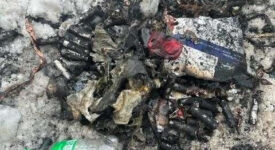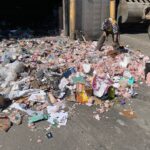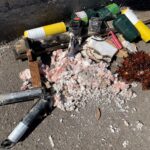Improper Battery Disposal Causes Lincoln Park Garbage Fire

Image courtesy of Hartel’s Disposal.
If you thought your day was a garbage fire, keep it in perspective. For Hartel’s Disposal, Tuesday’s garbage fire was literal. When a garbage truck driver in the Lincoln Park neighborhood noticed the contents of his truck were smoldering, they had to act fast, dumping the truckload of trash bags onto the ground. From somewhere in the heart of the pile, smoke billowed and sparks flared out like fireworks. The truck’s fire extinguisher was no match for the heat, and firefighters were dispatched to rake apart the pile and drench it with fire hoses. Picking through the pile after the fire was subdued, firefighters identified the remains of battery packs at the center of the charred garbage. Kevin Hartel and additional Hartel’s staff combed through the pile and discovered even more lithium-ion battery packs – the kind used in cordless power tools – improperly discarded among the household trash.
Lithium-ion batteries are everywhere in our daily lives – they power cell phones, laptops, E-bikes, vapes, electric cars, scooters, and other devices that require a lot of power sustained over a long battery life. When properly charged, used, and stored, most of these batteries never combust. But if damaged or overheated, the volatile components inside can ignite and fuel a long-lasting, high-temperature fire.
As lithium-ion batteries become more common, so do incidents like Tuesday’s fire. In the past year alone, two fires have broken out on the WLSSD transfer station tip floor – the warehouse where all our region’s trash is dumped out, checked for contaminants, and packed into semi-trucks headed for the landfill in Superior, Wisconsin. And once waste reaches the transfer station, the risks posed by combustible waste become more serious. With multiple truckloads of trash piled together and manipulated with heavy machinery, even previously undamaged batteries can be crushed or overheated. After a fire ignites, small wisps of smoke can be difficult to trace to their source in the dusty haze of the tip floor. The last time fire broke out at the WLSSD transfer station, the front end-loader operator had to call on other staff to observe the scene through an overhead security camera to isolate the source of the smoke before the fire grew too big. With the help of this bird’s eye view, the operator scooped the flaming garbage out of the pile and spread it outside where it was quickly isolated and extinguished.
- February 2022: A front-end loader zeroes in on the source of a transfer station fire.
- May 2022: Smoking garbage is spread outside the transfer station.
- May 2022: Possible culprits are identified.
Incidents like these are dangerous but preventable. To keep our community – and especially our essential sanitation workers – safe, we all must do our part to dispose of hazardous materials properly. WLSSD region residents* should bring the following waste batteries to the Household Hazardous Waste Facility at 2626 Courtland Street in Duluth:
- Lithium and lithium-ion batteries, which pose serious combustion risk.
- Rechargeable batteries (nickel cadmium, nickel metal hydride, and small sealed lead acid batteries), which contain heavy metals that can leach into the environment.
- Button batteries (from watches, hearing aids, and other small devices), which contain mercury and silver that can be recycled.
Batteries that can be disposed of in household trash include:
- Standard alkaline batteries (AA, AAA, C, D, and 9 volt).

Not sure what kind of batteries you have at home? It’s better to learn proper disposal now than run the risk of them becoming damaged and posing a threat in the home. Send us a picture of your mystery batteries at info@wlssd.com or call 218.722.3336 to learn more about proper disposal.
*Businesses and commercial entities in the region looking to properly dispose of hazardous waste should contact WLSSD’s Clean Shop program.





